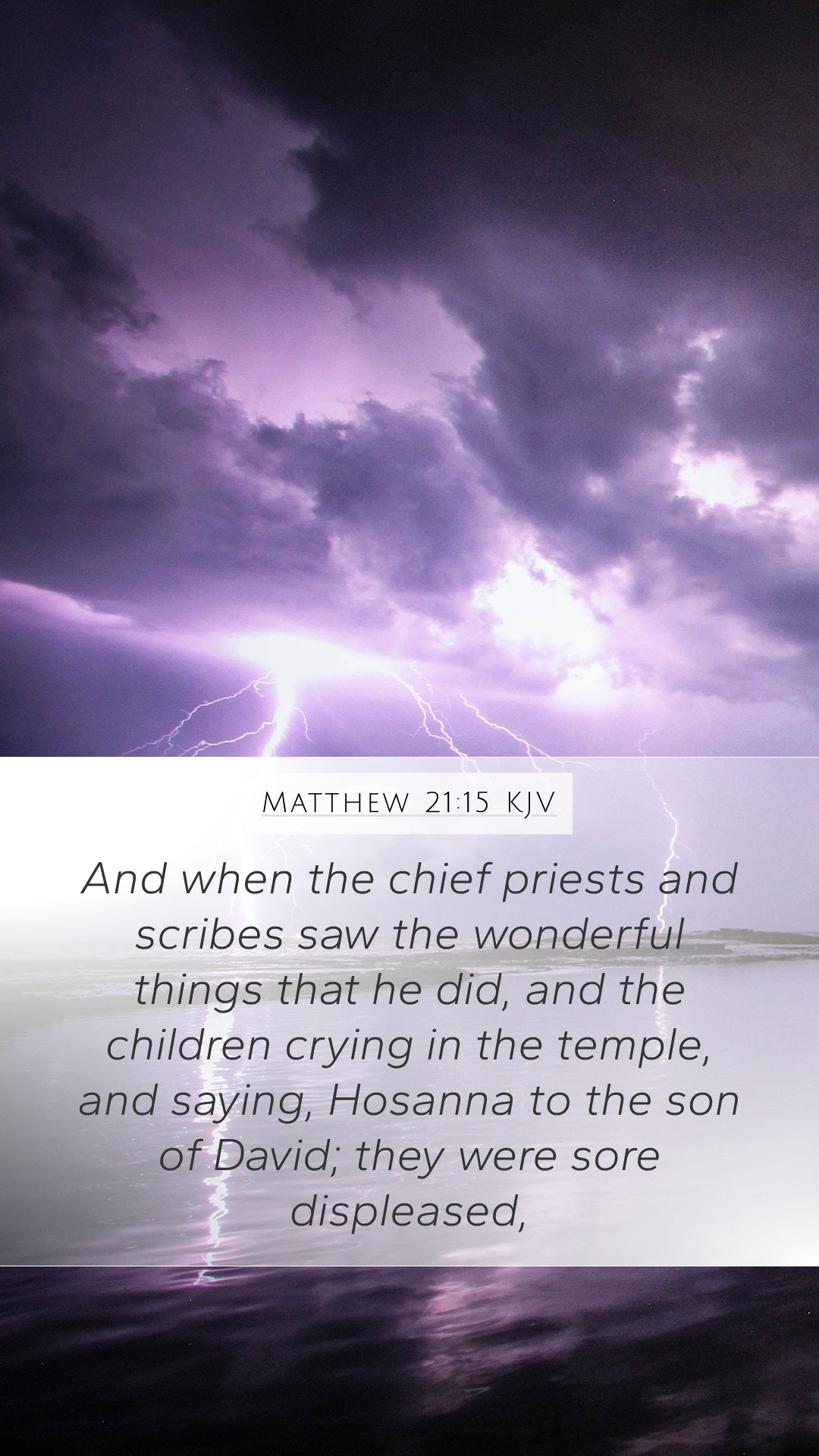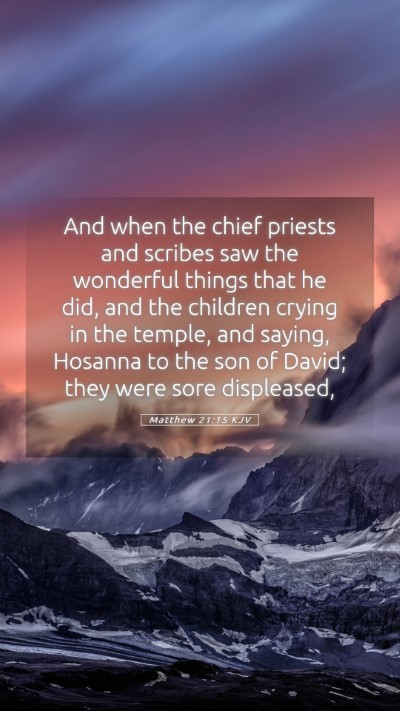Understanding Matthew 21:15 - Biblical Exegesis and Commentary
Matthew 21:15 states: "But when the chief priests and the scribes saw the wonderful things that he did, and the children crying out in the temple, ‘Hosanna to the Son of David!’ they were indignant."
This verse captures a vital moment in the life of Jesus during His final week of ministry. The reactions of the religious leaders highlight the conflict between Jesus and the established authorities of the day.
Summary of Meaning
The meaning of this verse reflects a significant tension within the narrative of the Gospel. The children proclaiming Jesus as the "Son of David" signify a recognition of Jesus' messianic identity. Meanwhile, the indignation of the chief priests and scribes reveals their jealousy and resistance to Jesus' authority and the burgeoning recognition of His role among the people.
Detailed Commentary Insights
Matthew Henry's Commentary Overview
Matthew Henry emphasizes that the children’s praise in the temple naturally provokes the ire of the religious leaders. He interprets their reaction as a response rooted in jealousy and a fear of losing their influence. Henry highlights how the religious elite were aware of the implications of Jesus’ acceptance among the people, particularly how it aligns with Old Testament prophecies regarding the Messiah.
Albert Barnes’ Exegesis
Albert Barnes offers insights into the nature of the "wonderful things" performed by Jesus, focusing on His miracles and teachings that captivated the audiences, especially the children. Barnes points out that the acclamation of Jesus as the “Son of David” was a messianic title, suggesting that the religious leaders' indignation was a reaction to their loss of control over the temple's authority, which they had traditionally exercised over the worshippers.
Adam Clarke’s Perspective
Adam Clarke provides a contextual look at the setting of the temple, indicating that such acclamations were a direct challenge to the authority of the religious leaders. He notes the irony of the situation; the temple, intended to be a place of worship, has become a battleground for conflicting ideologies. Clarke advocates a deeper understanding of the joyful response of the children, suggesting that their innocent praise truly captures the heart of faithful worship, in stark contrast to the bitterness of the religious leaders.
Implications for Today
From a modern Christian perspective, this verse serves as a potent reminder of the contrasts and conflicts that can arise within spiritual communities. It encourages believers to examine their own responses to Jesus' teachings and works, promoting a spirit of praise rather than indignation when faced with divine revelation.
Cross References
- Psalm 8:2 - Out of the mouths of infants and nursing babies, You have ordained strength.
- Matthew 21:16 - And He said to them, “Yes. Have you never read, ‘Out of the mouth of babes and nursing infants You have perfected praise’?”
- Luke 19:39-40 - And some of the Pharisees called to Him from the crowd, “Teacher, rebuke Your disciples.” But He answered and said to them, “I tell you that if these should keep silent, the stones would immediately cry out.”
- Mark 11:18 - And the scribes and chief priests heard it and sought how they might destroy Him; for they feared Him, because all the people were astonished at His teaching.
- Isaiah 9:6 - For unto us a child is born, unto us a son is given; and the government will be upon His shoulder...
Applications of Matthew 21:15
This scripture analysis not only provides a rich understanding of the tensions present in Jesus' ministry but also implores believers to reflect on their own worship. In-depth Bible verse analysis encourages a deeper engagement with problematic passages and invites Christians to apply these biblical lessons to their everyday lives.
Conclusion
The profound meanings derived from Matthew 21:15 through the eyes of authoritative commentaries encourage believers to foster a humble spirit, childlike faith, and unwavering recognition of Jesus’ sovereign role. This verse demonstrates how praise and acknowledgment of Jesus' messianic identity can lead to both fervent worship and conflicted responses from those in power. As we engage with the significance of Jesus' teachings, we are called to embrace a spirit of adoration, reflecting the joyful shout of the children in the temple.


